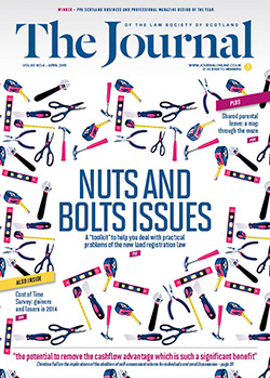Sustainability: applying the presumption

This article follows on from my briefing (Journal, July 2014, 26) on the Scottish Government’s proposal to introduce a presumption in favour of “sustainable development” in Scottish Planning Policy (SPP). There has since been some uncertainty as to how that presumption should be interpreted and applied in planning decisions and appeals.
Always a material consideration for proposals that do not accord with up-to-date development plans, the presumption becomes a significant material consideration where relevant development plan policies are out-of-date or the plan does not contain policies relevant to the proposal. It is a rebuttable presumption that requires a full assessment of the proposal and that there are no unacceptable impacts that would clearly outweigh the benefits when assessed against the SPP.
To assist the decision-maker, SPP sets out 13 guiding principles that will be used to assess the sustainability of a proposal, as set out in the previous article. The difficulty for the decision-maker is how to balance these potentially competing factors and what additional weight (if any) should be placed on particular factors.
In England, which also adheres to the presumption although it is more simply expressed in three pillars, (1) an economic role; (2) a social role; and (3) an environmental role, it has been used to justify planning permission for housing developments on greenfield sites where there was a demonstrable shortage of supply.
A more cautious approach appears to have been taken in Scotland, with the presumption being a consideration in two appeal decisions on housing proposals (DPEA-PPA-230-2124, 3 September 2014, and DPEA-PPA-250-2176, 5 September 2014). In each appeal (both were refused) the reporter found there was a shortage of housing supply (planning authorities are required to maintain a five-year supply) and that the presumption in favour of sustainable development applied, but that the developments would harm the character of the area and that outweighed the presumption.
Ministerial decisions
In November 2014, Alex Neil MSP was appointed Cabinet Secretary for a portfolio that includes planning. He has made a considerable impact, with the “recall” of a number of planning appeal decisions, including two for housing developments for which decisions (granting permission) have recently been issued. That means that rather than have an appeal delegated to a reporter in the usual way, he has directed that the reporter report to ministers in order that they may take the decision. The reasons for the recall are stated to be that the delivery of appropriate housing developments, particularly in growth areas and in accordance with SPP, are issues of national significance. This is an example where the Cabinet Secretary can and has shown leadership through his planning decision-making.
On 10 March 2015, the Scottish ministers upheld an appeal (DPEA-PPA-230-2131) for a significant housing proposal in the greenbelt on the outskirts of Edinburgh, indicating that they were minded to grant planning permission. The report on which that decision was made indicates that there is a significant shortfall in housing supply and the proposal would meet the key SPP criteria of the presumption, and that is an important material consideration that must be accorded significant weight.
On 13 March 2015, ministers upheld an appeal (DPEA-PPA-210-2043), indicating that they were minded to grant planning permission for a housing proposal in the green belt in East Lothian. The report on which that decision was made indicates that the presumption will be a significant material consideration where a local plan is out of date and it applies to the proposal at appeal which would contribute to economic growth in a relatively accessible location.
Interestingly, on 20 March 2015, a reporter dismissed an appeal (DPEA-380-2048) and refused planning permission for a major new settlement (Owenstown in South Lanarkshire). While arguments in favour of the presumption were made, there was no shortfall in housing. The reporter held that the development plan was relevant and the 13 guiding principles above did not overall favour the proposal, nor would the proposal represent the right development in the right place. The proposal was therefore not considered to be sustainable development and was contrary to the development plan.
Wider relevance
This is an evolving area and there is no doubt a greater importance and focus being placed on the presumption in planning decision-making. There is a complex interplay between the presumption and the legal requirement for planning decisions to be development plan led unless material considerations indicate otherwise. Interested parties will wish to examine the above decisions carefully, and also look beyond housing developments to see how the presumption may apply to other types of development.
In this issue
- Keeping Government responsible
- Contempt, or good faith?
- Reform – 170 years on
- Employee ownership: adding trust
- The gender gap: coming clean
- Cyber risk - are you covered?
- Reading for pleasure
- Opinion: Graham Sykes
- Book reviews
- Profile
- President's column
- Land Register completion update
- People on the move
- Tools for today's titles
- Those elusive profits
- The Budget and the crystal ball
- Child of our time?
- Elephant in very many rooms
- Video: the best evidence?
- Who would be a legislator?
- Sustainability: applying the presumption
- A woman’s work…
- Scottish Solicitors Discipline Tribunal
- Living the dram
- Land information: a one-stop shop
- From the Brussels office
- Registered paralegals: what trends?
- Law reform roundup
- MHO reports – please help with timing data
- Plaque marks WW1 lawyer dead
- Selling yourself from day one
- View from the grass roots
- Keep it in the family
- Ask Ash
- When cooling-off kicks in
- Bottom line, the accountants are coming
- First day in the office






